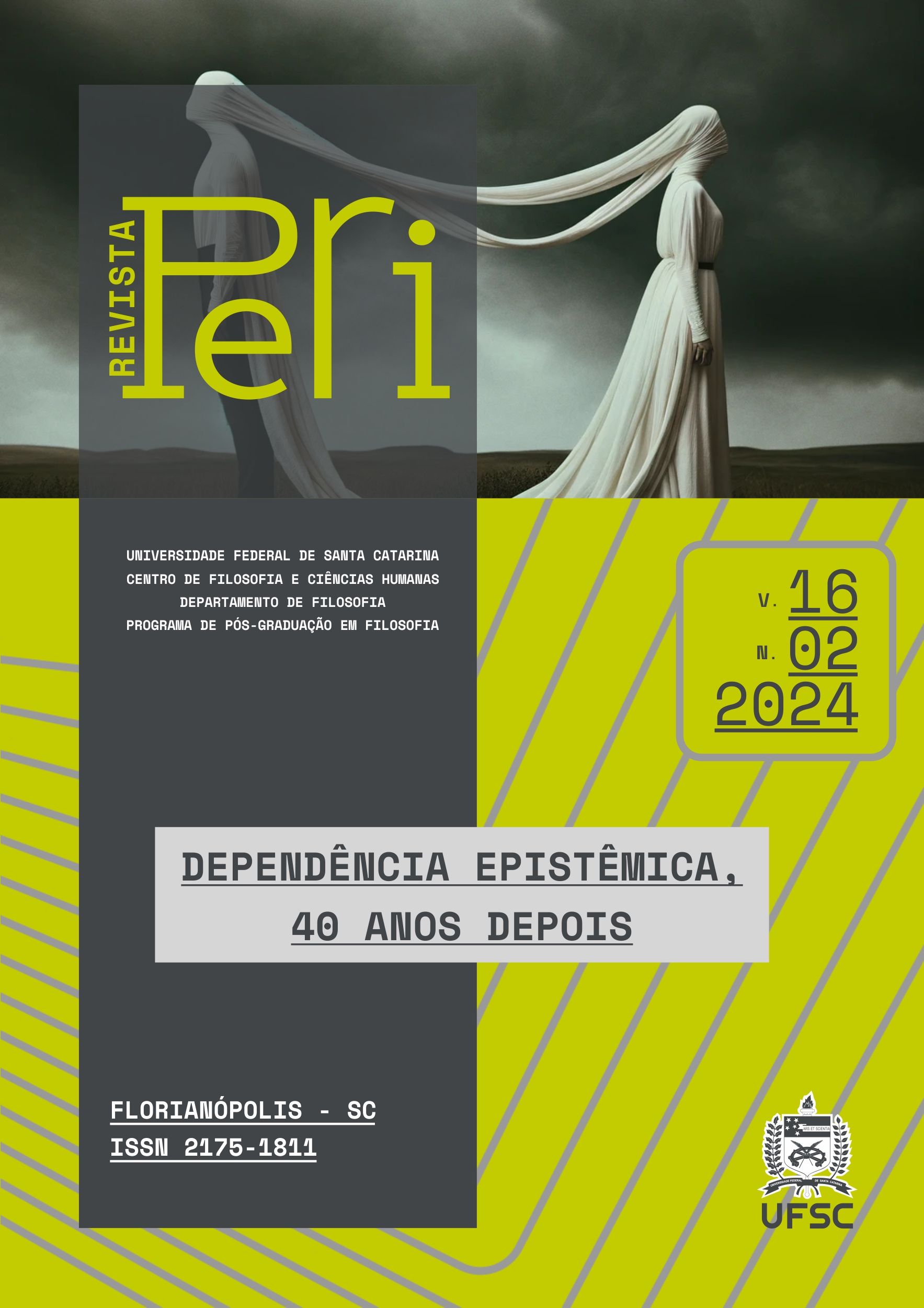Natureza da Especialização e Dependência Epistêmica no Ensino de História
Um Caso de Epistemologia Social Aplicada
Palavras-chave:
natureza da especialidade, dependência epistêmica, ensino de história, conhecimento histórico, epistemologia social aplicadaResumo
Em um diálogo entre teoria da história, ensino de história, história pública e epistemologia da especialização (expertise), este trabalho pretende definir a natureza da especialização e enfrentar o problema da dependência epistêmica no caso do ensino de história. Tomando o ensino de história na educação básica como um lugar estratégico para a experiência da história pública no Brasil, reflete-se sobre a relação que o historiador estabelece com o público em seus aspectos éticos e políticos. Destaca-se a necessidade de um conjunto de três saberes: os saberes a ensinar (conteúdos históricos), os saberes para ensinar (habilidades didáticas) e os saberes do aprender, sendo este último relativo ao próprio público. Entende-se, então, a natureza da especialização no ensino de história em termos relacionais e disposicionais. Quanto à questão da dependência epistêmica, defende-se que especialistas no ensino de história sejam capazes de ajudar discentes a ampliarem sua autonomia intelectual e epistêmica, o que inclui o reconhecimento de suas próprias limitações e o valor das diversas especialidades historiográficas. Trata-se, portanto, de um trabalho de epistemologia social aplicada ao ensino de história.
Referências
ARAUJO, V. L.; RANGEL, M. de M. Apresentação - Teoria e história da historiografia: do giro linguístico ao giro ético-político. História da Historiografia: International Journal of Theory and History of Historiography, v. 8, n. 17, p. 318-332, 29 abr. 2015. Disponível em: https://www.historiadahistoriografia.com.br/revista/article/view/917. Acesso em: 5 fev. 2024.
BALLANTYNE, N. Epistemic Trespassing. Mind, v. 128, n. 510, p. 367-395, 2019.
CAIMI, F. E. O que precisa saber um professor de história? História e Ensino, Londrina, v. 21, n. 2, pp. 105-124, 2015.
FONSECA, S. G.. O ensino de história e a construção da cidadania. In: FONSECA, S. G. Didática e prática de ensino de história: experiências, reflexões e aprendizados. Campinas, Papirus: 2008.
GOLDMAN, A. Expertise. Topoi, v. 37, p. 3-10, 2016. Disponível em: https://link.springer.com/article/10.1007/s11245-016-9410-3
GOLDMAN, A. Experts: Which Ones Should You Trust? Philosophy and Phenomenological Research, v. 63, p. 85-110, 2001.
GOLDMAN, A.; O‘CONNOR, C. Social Epistemology. In: ZALTA, E. N. (Ed.). The Stanford Encyclopedia of Philosophy, 2021. Disponível em: https://plato.stanford.edu/archives/win2021/entries/epistemology-social/
HARDWIG, J. Epistemic dependence. The Journal of philosophy, v. 82, n. 7, pp. 335-349, 1985.
NICOLAZZI, F. Muito além das virtudes epistêmicas. O historiador público em um mundo não-linear. Maracanan, Rio de Janeiro, n. 18, pp. 18-34, 2018. Disponível em: https://www.e-publicacoes.uerj.br/maracanan/article/view/31121.
PENNA; F. de A.; SILVA, R. da C. A. da. As operações que tornam a história pública: a responsabilidade pelo mundo e o ensino de história. In: MAUAD, A. M.; ALMEIDA, J. R.; SANTHIAGO, R. (Orgs.). História Pública no Brasil: sentidos e itinerários. São Paulo, Letra e Voz: 2016. pp. 195-205.
ROCHA, L.; MÜLLER, F. M. Testemunho e expertise. In: MÜLLER, F. M.; ETCHEVERRY, K. M. (orgs.). Ensaios sobre epistemologia do testemunho. Porto Alegre, Editora Fi: 2017. Disponível em: https://www.editorafi.org/202felipemuller
RODRIGUES, R. R. et al. História: usos do passado, ética e negacionismo. São Paulo: Pimenta Cultural, 2023. Disponível em: https://www.pimentacultural.com/wp-content/uploads/2024/04/eBook_historia-usos.pdf
ROLLEMBERG, D.; CORDEIRO, J. M. Revisionismo e negacionismo: controvérsias. História, histórias, v. 9, n. 17, pp. 58-98, 2021.
RÜSEN, J. História Viva: teoria da História III: formas e funções do conhecimento histórico. Brasília, UnB: 2007. 159p.
SIEGEL, H. Rationality and epistemic dependence. Educational Philosophy and Theory, v. 20, n. 1, p. 1-6, 1988.
Downloads
Publicado
Edição
Seção
Licença
Copyright (c) 2025 Muriel Custodio dos Passos

Este trabalho está licenciado sob uma licença Creative Commons Attribution-NonCommercial-ShareAlike 4.0 International License.
1. Autores mantém os direitos autorais e concedem à revista o direito de primeira publicação, com o trabalho simultaneamente licenciado sob a Creative Commons Attribution License que permite o compartilhamento do trabalho com reconhecimento da autoria do trabalho e publicação inicial nesta revista.
2. Autores têm autorização para assumir contratos adicionais separadamente, para distribuição não-exclusiva da versão do trabalho publicada nesta revista (ex.: publicar em repositório institucional ou como capítulo de livro), com reconhecimento de autoria e publicação inicial nesta revista.
3. Autores têm permissão e são estimulados a publicar e distribuir seu trabalho online (ex.: em repositórios institucionais ou na sua página pessoal) a qualquer ponto antes ou durante o processo editorial, já que isso pode gerar alterações produtivas, bem como aumentar o impacto e a citação do trabalho publicado (Veja O Efeito do Acesso Livre).


